A Civilian Climate Corps
Air Date: Week of February 26, 2021
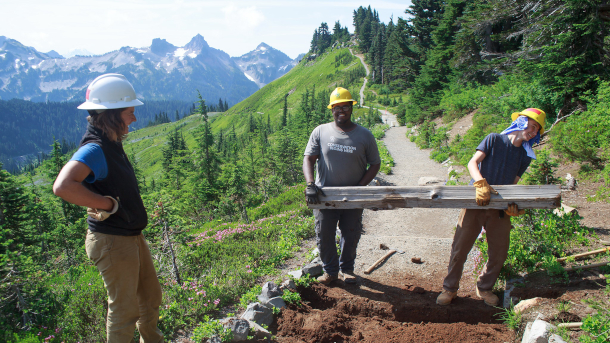
A Student Conservation Association crew is all smiles as they work to restore a trail in the popular Paradise area of Mount Rainier National Park (Photo: Kevin Bacher / NPS, Flickr CC BY 2.0)
President Biden has directed the federal government to plan a Civilian Climate Corps loosely styled on the New Deal CCC that put millions to work building trails and park facilities during the Great Depression. Washington Governor Jay Inslee joins Host Steve Curwood to share a vision for how a climate corps could aid conservation, combat climate disaster, and help save energy while harnessing the energy of youth volunteers in America.
Transcript
CURWOOD: A Civilian Climate Corps is part of President Biden’s plans to address the climate crisis. The modern CCC harkens back to the Civilian Conservation Corps created by President Franklin Delano Roosevelt in the 1930s. FDR’s CCC put some 3 million men to work in conservation efforts, and yes, they were just about all men. They planted some 3 billion trees, constructed trails and shelters in parks across the country, and built thousands of fire towers. Much of that work can still be seen today. A job in the CCC earned a young man 1 dollar a day plus food and housing. And it put money in the pockets of families during the depths of the Great Depression and was cheered as a resounding success at the time. During one of his famous Fireside Chats in May of 1933 FDR explained how the CCC would help the nation.
PRESIDENT ROOSEVELT: In creating this civilian conservation corps we are killing two birds with one stone. We are clearly enhancing the value of our natural resources and at the same time we are relieving an appreciable amount of actual distress.
CURWOOD: Today a Civilian Climate Corps could put people to work reducing the risk of forest fires, restoring wetlands, planting trees, and weatherizing homes both in the United States and abroad. During the Democratic primary, several of President Biden’s opponents also proposed a climate corps. Among them was Washington state Governor Jay Inslee, who joins me now from the capital in Olympia. Welcome back to Living on Earth, Governor!
INSLEE: Thank you.
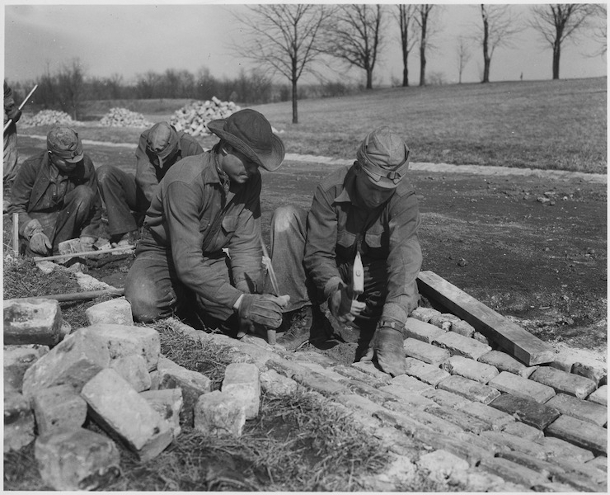
Civilian Conservation Corps members at work c. 1933. (Photo: U.S. National Archives and Records Administration, Wikimedia Commons public domain)
CURWOOD: So let's say that you were to take a look at your own state of Washington for some examples of the kind of work that the CCC would do. You've had horrendous wildfires, so I imagine you're very interested in thinning the forests, the fuel that can add to those. Where else might it be especially useful?
INSLEE: Everywhere. This is a ubiquitous opportunity, because anywhere there's a house, there is an opportunity to reduce energy wastage. And that's the first place you get clean fuel, the very cheapest, first, most productive fuel, clean energy is always stop wasting it. So helping people rehab their houses, get more insulation into their homes, starting with those who are in low-income homes, who frequently are living in places that just waste humongous amounts of energy, so these poor folks are trying to make huge energy payments to the utility company. When instead, we can have a young person come in and rehab the home, do these kind of retrofits that people can do with relatively modest amounts of training. Every city, every suburb in the country has these opportunities right now. And then a part that I think hopefully is more focused on vocational skill development, career development. You kind of think, what can I do to something, to really focus on a long term career, not just in the climate corps. That might be as exotic as, you know, learning how to maintain electric vehicles, because that's we're going to be driving ten, twelve years from now, almost, if not exclusively, predominantly. So starting those kind of career paths, helping people you know, have an income while you're learning that. This is terribly exciting for the long term vocational future of people.
CURWOOD: So this all sounds great about the CCC, but you know, it can't be cheap, especially if corps members are paid a good living wage for their work. How much is it going to cost to have this Civilian Climate Corps? How much money do you think Congress needs to appropriate?
INSLEE: This is a scalable issue, $1 is good, and $100 million is better. And so I don't think there's a minimal or a maximum, if you will, it's just what can fit in with the other priorities of the federal government. But I think that once you see it, it will succeed like the AmeriCorps has succeeded. The very first vote I took as a member of the US Congress was to establish the AmeriCorps program. And I go around my state, and I see these kids -- and I say, "kids", I mean, they're mostly young adults -- who are doing this work. And whenever you see them, they all have something in common. Doesn't matter what race they are, doesn't matter if they're urban or rural. They all have a big smile. Because they're doing something they believe in. And they think they're helping people in their community. And they're learning something. And it's unfortunate that Republicans have tried to kill this project, maybe every year since I was in Congress, first in 1993. And they have failed, and they have failed because people in their communities understand what this good work means to their communities. And you had all these people who, it was important in their life's development. I think that'll be the same about the climate corps, it's built somewhat on the same principles, with a more focused message, to connect people to this worldwide challenge.
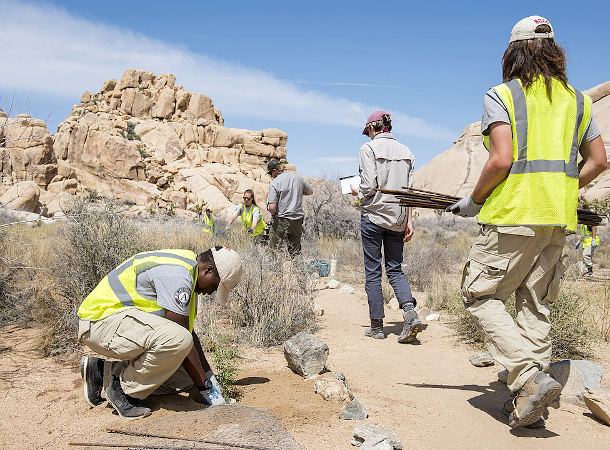
An Americorps crew at work doing restoration at Joshua Tree National Park, April 2018 (Photo: Hannah Schwalbe / NPS, Wikimedia Commons public domain)
CURWOOD: Yeah, I was going to ask, you know, many young people I speak to are desperate to do something to deal with the climate emergency, which they see as this humongous freight train barreling at them out of the future, and no way to jump out of the way.
INSLEE: Well, you are right, particularly the upcoming generation gets this big time, there's no question in their minds that this is a huge threat to their futures. You know, I'm, I'm old enough to remember the John F. Kennedy "Ask not what your country can do for you", this is a little bit of that. It can connect people to a larger national purpose. And I hear this as well, how do I plug in? What do I do? Where do I go, you know, what, you know? And this is just perfect to capture that huge energy that's out there. There's like a, you know, just a huge dam holding back energy, we want that energy to be released. And I think this climate corps is a way to do that. It will help as well build, you know, public support, political support, for some of the other things we need to do to get people visibly involved in this mission statement as well. You know, somebody comes up and says, this is a hoax, or this is going to hurt jobs, you say, look at all the jobs we're creating through this mechanism. So it's a, it's a win-win-win, in my book.
CURWOOD: So how can and should a program like this be designed to work in a smart way with the private sector so that you don't hear concerns about displacing already existing jobs?
INSLEE: Well, I think that, you know, these are not going to be the highest paying jobs in America. So I don't think you have to worry that much. We want to pay a living wage. But I don't, I really don't believe that's a viable concern. These are going to be answering things that we have not been able to finance or the market has not been able to finance yet. These are things that aren't happening today. So it's not like we're displacing existing jobs. But to the extent people are concerned about that, you have good community input in designing the programs, you develop as many partnerships as you can. So that if you have one corps volunteer, they serve multiple, you know, masters, they can work with a municipality, they can work with a state forest at the same time. It's just all about partnerships.
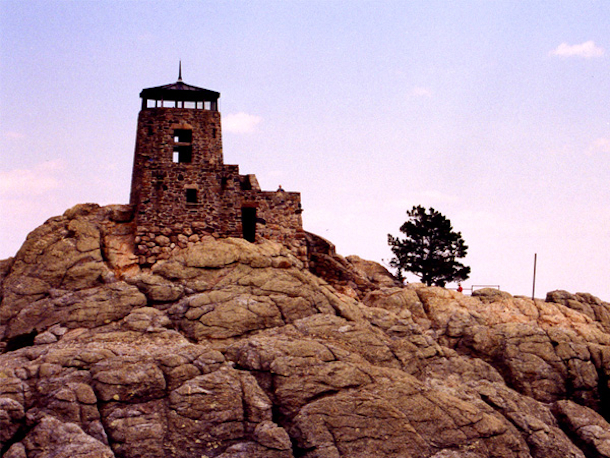
The CCC constructed the Harney Peak fire lookout tower in the Black Hills of South Dakota in 1939. (Photo: MisterSquirrel, Wikimedia Commons public domain)
CURWOOD: So the original Civilian Conservation Corps under FDR reinforced some social injustices, and even segregated black and white corps members into different camps, and there weren't a whole lot of women that were involved in this. How can this new CCC help progress towards greater equity in our society?
INSLEE: Well, you've put your finger on a very important point. One is the most obvious one, which is economically to give people more economic opportunities. And I'm convinced it will do that big time. You know, the young folks in a, in an urban area who don't have a family connected, to inherit the family business are now going to be able to get a great career. So that's a good thing. But there's another thing too, that's important to me. We have so many children, urban children particularly, who've never had experiences in the natural world. And giving them these experiences in a vocational setting is life changing for people. And so giving folks who've really never spent a night in a sleeping bag or a tent, never handled a polaski or a hoe or a shovel. My dad and mom used to revegetate alpine meadows on the slopes of Mount Rainier during the summer, they ran a group called the Student Conservation Association. And we, and they were kids, mostly from the East Coast, who came out to Mount Rainier National Park. And my dad, he told me the first week he did this, he was astounded because he'd get these kids who didn't know how to do a shovel. They wouldn't know where to put their foot on the shovel! And my dad kind of chuckled about that. But once they got that shovel in their hands, and once they spent a night in the tent, they were conservationists for their whole lives. I met a guy who was in my, one of my dad's programs, when I was running for governor, I don't know, about six, eight years ago. And you know, he'd been a dedicated environmentalist who'd funded a lot of good causes because of that project. And I think we're gonna have the same impact in people's lives, once they get a little taste of being outside.
CURWOOD: Now, you folks in the West have a lot of opportunity, a lot of public spaces, some big national forests and such. What suggestions do you have for folks in the East, in the more urban part of America? How might those cities and states get involved in this?
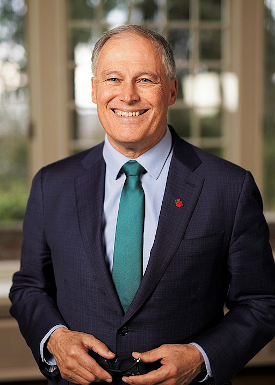
Washington Governor Jay Inslee ran on a climate-centric platform during the 2020 Democratic presidential race. (Photo: Office of the Governor, State of Washington, Wikimedia Commons public domain)
INSLEE: Well, there's outdoors in the East, if you go looking for 'em. And you don't have to be 100 miles from an urban, you can find a marsh wren and a great blue heron a couple miles, you know, from Manhattan. I live five and a half miles from downtown Seattle. And there's a little pocket, it's about maybe 16 acres, fairly close to where I live. It's a paradise! I go in there, and I'm as happy as I was in the middle of Grand Canyon. Because I can get a feeling of nature in a small place. And one of the ways this group I think can help is in education. So I can envision, if you were in this corps someday, working in this park, bringing in students to educate them about the life forms in their little park. And there's a lot of life right underneath our feet. And it's kind of thrilling. This little wren, I was in this little park the other day and this little wren, I'd never seen it before, comes skittering in, and it turns out, it's either a marsh wren or a winter wren, I never did figure it out. And kids love this. They just, they connect to this. You give a kid a little spade and ask them to dig up a little mound of earth and tell you what they find in there, and talk about how the climate can change that. If you have kids do a little pH test to test the acidity of a little pond, they go, they go crazy about that! And they become little environmentalists for the rest of their lives. That's what this corps can do, just even in a pocket park. You can connect to the whole rest of the world in something like that, if you have somebody showing you the way.
CURWOOD: Jay Inslee is the Democratic Governor of the State of Washington. Thanks so much for taking the time with me today.
INSLEE: You bet! We'll see you when we open up the corps, I hope you'll be there for the first group doing great work.
CURWOOD: I'll bring my shovel.
INSLEE: Alright! Take care, be well!
Links
The Guardian | “Biden’s New Conservation Corps Stirs Hopes of Nature-Focused Hiring Spree”
Read Governor Jay Inslee’s Call to Action for a Climate Conservation Corps from May 2019
Grist | “This $9 Billion Plan Could Bring Biden’s Conservation Corps to Life”
Living on Earth wants to hear from you!
Living on Earth
62 Calef Highway, Suite 212
Lee, NH 03861
Telephone: 617-287-4121
E-mail: comments@loe.org
Newsletter [Click here]
Donate to Living on Earth!
Living on Earth is an independent media program and relies entirely on contributions from listeners and institutions supporting public service. Please donate now to preserve an independent environmental voice.
NewsletterLiving on Earth offers a weekly delivery of the show's rundown to your mailbox. Sign up for our newsletter today!
 Sailors For The Sea: Be the change you want to sea.
Sailors For The Sea: Be the change you want to sea.
 The Grantham Foundation for the Protection of the Environment: Committed to protecting and improving the health of the global environment.
The Grantham Foundation for the Protection of the Environment: Committed to protecting and improving the health of the global environment.
 Contribute to Living on Earth and receive, as our gift to you, an archival print of one of Mark Seth Lender's extraordinary wildlife photographs. Follow the link to see Mark's current collection of photographs.
Contribute to Living on Earth and receive, as our gift to you, an archival print of one of Mark Seth Lender's extraordinary wildlife photographs. Follow the link to see Mark's current collection of photographs.
 Buy a signed copy of Mark Seth Lender's book Smeagull the Seagull & support Living on Earth
Buy a signed copy of Mark Seth Lender's book Smeagull the Seagull & support Living on Earth

